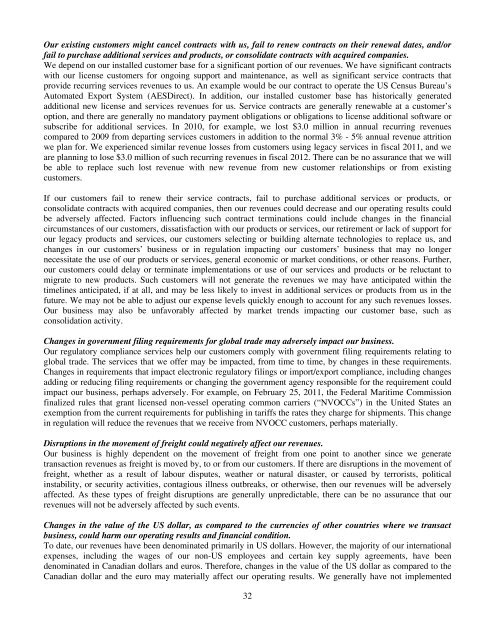THE DESCARTES SYSTEMS GROUP INC.
THE DESCARTES SYSTEMS GROUP INC.
THE DESCARTES SYSTEMS GROUP INC.
Create successful ePaper yourself
Turn your PDF publications into a flip-book with our unique Google optimized e-Paper software.
Our existing customers might cancel contracts with us, fail to renew contracts on their renewal dates, and/or<br />
fail to purchase additional services and products, or consolidate contracts with acquired companies.<br />
We depend on our installed customer base for a significant portion of our revenues. We have significant contracts<br />
with our license customers for ongoing support and maintenance, as well as significant service contracts that<br />
provide recurring services revenues to us. An example would be our contract to operate the US Census Bureau’s<br />
Automated Export System (AESDirect). In addition, our installed customer base has historically generated<br />
additional new license and services revenues for us. Service contracts are generally renewable at a customer’s<br />
option, and there are generally no mandatory payment obligations or obligations to license additional software or<br />
subscribe for additional services. In 2010, for example, we lost $3.0 million in annual recurring revenues<br />
compared to 2009 from departing services customers in addition to the normal 3% - 5% annual revenue attrition<br />
we plan for. We experienced similar revenue losses from customers using legacy services in fiscal 2011, and we<br />
are planning to lose $3.0 million of such recurring revenues in fiscal 2012. There can be no assurance that we will<br />
be able to replace such lost revenue with new revenue from new customer relationships or from existing<br />
customers.<br />
If our customers fail to renew their service contracts, fail to purchase additional services or products, or<br />
consolidate contracts with acquired companies, then our revenues could decrease and our operating results could<br />
be adversely affected. Factors influencing such contract terminations could include changes in the financial<br />
circumstances of our customers, dissatisfaction with our products or services, our retirement or lack of support for<br />
our legacy products and services, our customers selecting or building alternate technologies to replace us, and<br />
changes in our customers’ business or in regulation impacting our customers’ business that may no longer<br />
necessitate the use of our products or services, general economic or market conditions, or other reasons. Further,<br />
our customers could delay or terminate implementations or use of our services and products or be reluctant to<br />
migrate to new products. Such customers will not generate the revenues we may have anticipated within the<br />
timelines anticipated, if at all, and may be less likely to invest in additional services or products from us in the<br />
future. We may not be able to adjust our expense levels quickly enough to account for any such revenues losses.<br />
Our business may also be unfavorably affected by market trends impacting our customer base, such as<br />
consolidation activity.<br />
Changes in government filing requirements for global trade may adversely impact our business.<br />
Our regulatory compliance services help our customers comply with government filing requirements relating to<br />
global trade. The services that we offer may be impacted, from time to time, by changes in these requirements.<br />
Changes in requirements that impact electronic regulatory filings or import/export compliance, including changes<br />
adding or reducing filing requirements or changing the government agency responsible for the requirement could<br />
impact our business, perhaps adversely. For example, on February 25, 2011, the Federal Maritime Commission<br />
finalized rules that grant licensed non-vessel operating common carriers (“NVOCCs”) in the United States an<br />
exemption from the current requirements for publishing in tariffs the rates they charge for shipments. This change<br />
in regulation will reduce the revenues that we receive from NVOCC customers, perhaps materially.<br />
Disruptions in the movement of freight could negatively affect our revenues.<br />
Our business is highly dependent on the movement of freight from one point to another since we generate<br />
transaction revenues as freight is moved by, to or from our customers. If there are disruptions in the movement of<br />
freight, whether as a result of labour disputes, weather or natural disaster, or caused by terrorists, political<br />
instability, or security activities, contagious illness outbreaks, or otherwise, then our revenues will be adversely<br />
affected. As these types of freight disruptions are generally unpredictable, there can be no assurance that our<br />
revenues will not be adversely affected by such events.<br />
Changes in the value of the US dollar, as compared to the currencies of other countries where we transact<br />
business, could harm our operating results and financial condition.<br />
To date, our revenues have been denominated primarily in US dollars. However, the majority of our international<br />
expenses, including the wages of our non-US employees and certain key supply agreements, have been<br />
denominated in Canadian dollars and euros. Therefore, changes in the value of the US dollar as compared to the<br />
Canadian dollar and the euro may materially affect our operating results. We generally have not implemented<br />
32



